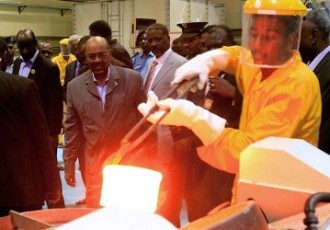Sudan complains about negative impact of US sanctions on mining activities
January 11, 2016 (KHARTOUM) – Sudan’s ministry of minerals has complained about the negative impact of the US economic sanctions on the mining activities of the Ariab Mining Company (AMC).

Following his meeting with Sudan’s minister of minerals Ahmed al-Karouri Monday, the Canadian chargé d’affaires in Khartoum has vowed to make contacts to bring in Canadian mining companies to Sudan.
He hoped that some Canadian companies with its huge expertise and leading social responsibility role operate in Sudan just like in other African nations.
Al-Karouri for his part praised the partnership which was struck up between the AMC and several Canadian companies despite the obstacles posed by the US sanctions.
He urged the Canadian companies to invest in the gold ore transformational industries in Sudan, vowing to reserve several blocks for the Canadian investments.
Washington imposed economic and trade sanctions on Sudan in 1997 in response to its alleged connection to terror networks and human rights abuses. In 2007 it strengthened the embargo, citing abuses in Darfur which it labelled as genocide.
Meanwhile, Karouri, who met the state minister of health Sumaia Akad Monday, said they managed to import 12 advanced laboratories including 86 units from the United Kingdom to conduct health tests on traditional miners, saying they no longer need to conduct those tests abroad.
Akad, for her part, called for developing a joint plan between the ministries of health and minerals to reduce the risk of chemicals use in the traditional mining sector.
Gold has become one of Sudan’s largest exports which partially compensated for the loss in oil revenues, which accounted for more than 50% of income until 2011 when South Sudan seceded, thus taking with it most of the country’s oil reserves.
Sudan approved a law to regulate traditional mining by granting licenses and specifying areas to work in to protect them from hazardous conditions and smuggling.
It is believed that traditional mining employs more than a million Sudanese but it is still difficult to obtain credible data.
(ST)
